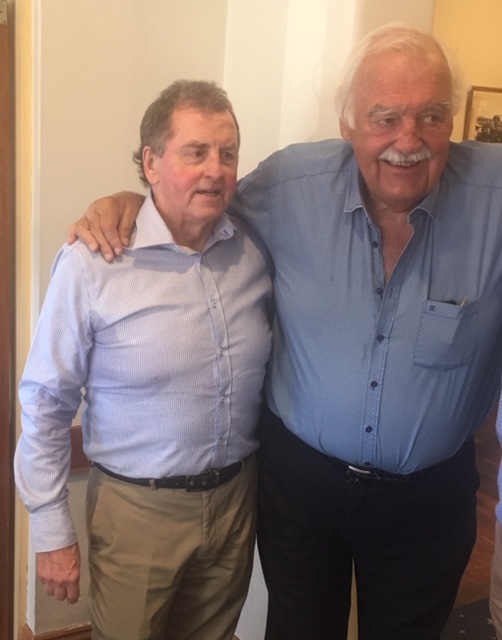DENIS Pagan was one of the best coaches in the AFL – until he took on Mission Impossible, writes RON REED:
BE CAREFUL what you wish for. As a schoolboy growing up in Carlton, all Denis Pagan dreamed of was playing footy for the Old Dark Navy Blues. It never happened, but he did eventually go a step further than that and coached them for almost five years – which, he now admits, might have been the worst decision of his life.
You have no idea what it was like working there. It was as if coming in every morning there was an invisible man at the door with a big sledgehammer which he would use to hit you under the chin and say, ‘Now see if you can coach, Pagan,’” he says.
Almost 12 years after that nightmare ended with him being sacked midway through the 2007 season, Pagan, 71, still has an uneasy relationship – to say the least – with the club that was his first love.
Asked to speak at the fortnightly Friday lunches hosted by former Blues star Percy Jones at the North Fitzroy Arms Hotel, Pagan hesitated until he was assured he would not be walking into a hissing den of navy blue loyalists looking for a scapegoat to blame for the famous old club’s long and agonising exile in the footy wilderness.

It would have been grossly unfair if that had been the case, which it wasn’t.
For one thing, it wasn’t Pagan’s fault that Carlton was in disarray after losing its draft picks after being sprung cheating the salary cap or that it was in administrative turmoil with presidents coming and going, and for another the grim statistics of his time there – 25 wins from 104 matches – will never obscure the reality that for a decade at North Melbourne he was one of the best and most successful coaches the game has seen in the modern era.
There, he had 150 wins from 240 matches, missed the finals only once, won two premierships and contested another grand final and was selected to coach the all-Australian team. He was named North’s coach of the century, beating the legendary Ron Barassi – also a dual premiership coach at the club – to the accolade.
He also played 120 matches for the Kangaroos – and 23 for South Melbourne – while it is sometimes forgotten that he coached North under 19s to nine grand finals in a row, winning five flags, and then took Essendon reserves to a premiership in his only year there.
It’s quite a record for someone who describes himself as having “masqueraded as a League footballer”.
What made him so successful after he hung up his boots?
“A good people manager can be a successful AFL coach,” he says.
“I was a tough love coach. So many people these days think it’s a popularity contest. It isn’t. It’s about respect.
“Give some people an inch and they’ll take the whole ruler and that’s the end of the penny section.
“This sensitive, new-age coaching going on at the moment … I know I’m a silly old guy, a silly old fool. But I reckon Richmond was the best side by the length of the Flemington straight last season and they mucked it up.
“I coached (Tigers coach) Damien Hardwick at Essendon and I hope he’s learned the lesson that cotton wool coaching and sensitive new-age football is never ever, ever going to be successful in September.”
Without elaborating on precisely what Hardwick got wrong about their preparation during the finals, Pagan said that if the Tigers were fair dinkum this year “they’re probably there”.
A perfectionist in his own preparation – Pagan stayed up all night working on his dossier when he was called to an interview for the Kangaroos job and made sure he dressed in a new, crisp white shirt, striped tie, black slip-on shoes and a gold watch with a black band — he is a disciple of old-time coaches Norm and Len Smith and, unsurprisingly, Barassi.
His respect for Barassi has not been diluted by the master coach sacking him twice. The first time was when he was playing under 19s for Carlton at the age of 17, convinced that a progression to the seniors would just be “normal”.
Barassi shattered that dream so he went to North, where he did become a senior player until the same coach moved him on again after the losing 1974 Grand Final – but not before giving him some invaluable advice.
“He told me, take responsibility for your own actions, no regrets, no excuses, no alibis, don’t ever point the finger at anybody else, rectify things yourself,” he said.
“I just reckon that if this whole country did that we would be much better off.”
Pagan was so delighted to get the job at North that he didn’t even ask how much it paid. Told eventually that it would be $90,000, he protested that he was getting more than that as an insurance broker. So they added another 10k – but what he really profited from was the lessons in life he got from then North president, the much-admired broadcaster Ron Casey, who preached the value of unity.
“It was a great period to go to work, even though they had the backsides out of their trousers – there was no money but they were great people,” he said.
By the end of his tenth season there, 2002, he knew his time was up. Then Carlton came calling. “I wish I hadn’t answered the phone,” he says now, perhaps half in jest – or perhaps not.
He was shocked to be told when he got there that there were blokes playing in the seconds and being paid $550,000. And of course, they had to forfeit the chances to draft future champions in Brendon Goddard and Daniel Wells.
After a false dawn in 2004 when they won 10 games, two wooden spoons followed. If there was a silver lining, he said: “I learned a big lesson – sometimes in life things can’t be perfect. Some things you can’t change. So it was great experience. I don’t think I could have done anything to change it.
“They still haven’t recovered. I think it’s really sad for a once-great football club. They might have kicked a few own goals and let a few good players go. But if I was a Blues supporter I don’t think you’ll have to queue up for your season ticket.
“I hope they get it right and become strong again.”
RON REED has spent more than 50 years as a sportswriter or sports editor, mainly at The Herald and Herald Sun. He has covered just about every sport at local, national and international level, including multiple assignments at the Olympic and Commonwealth games, cricket tours, the Tour de France, America’s Cup yachting, tennis and golf majors and world title fights.



Discussion about this post